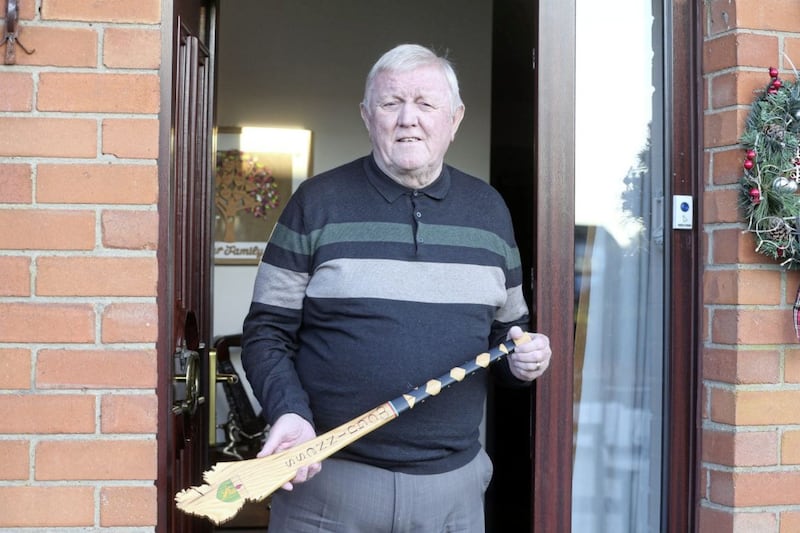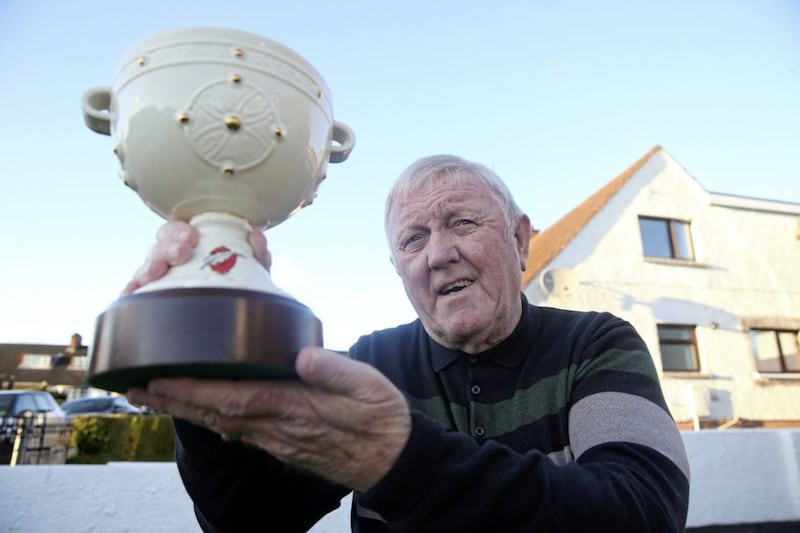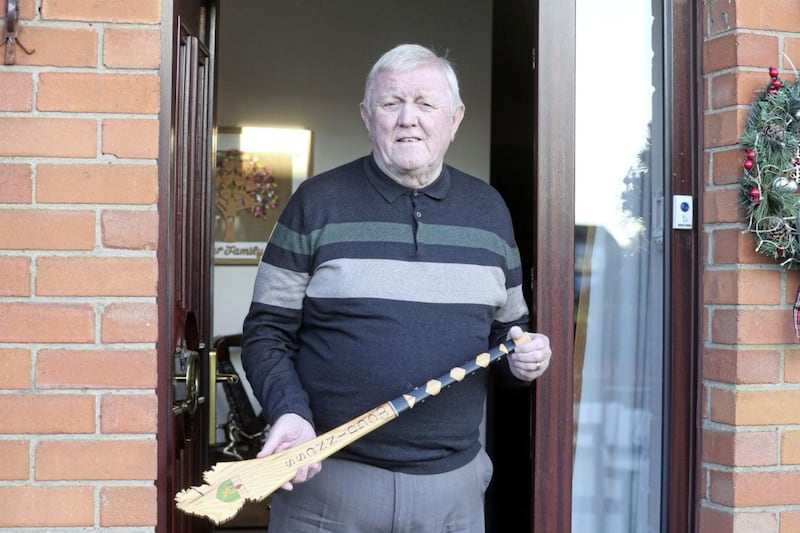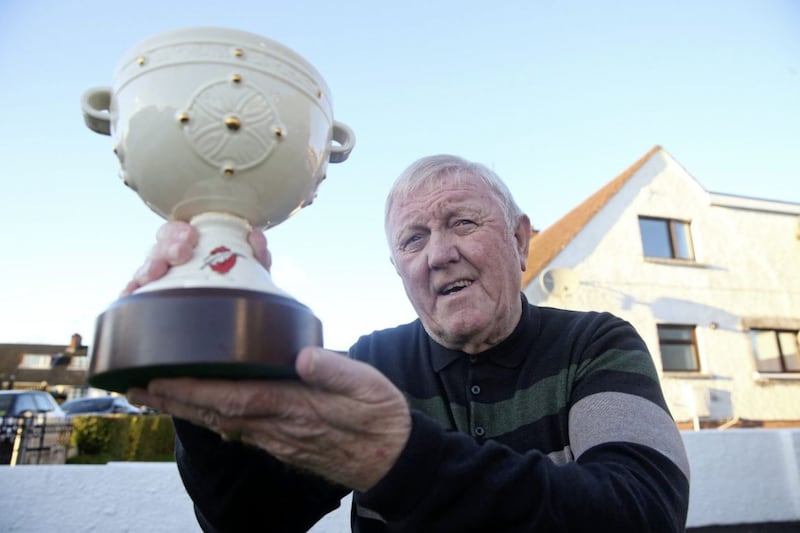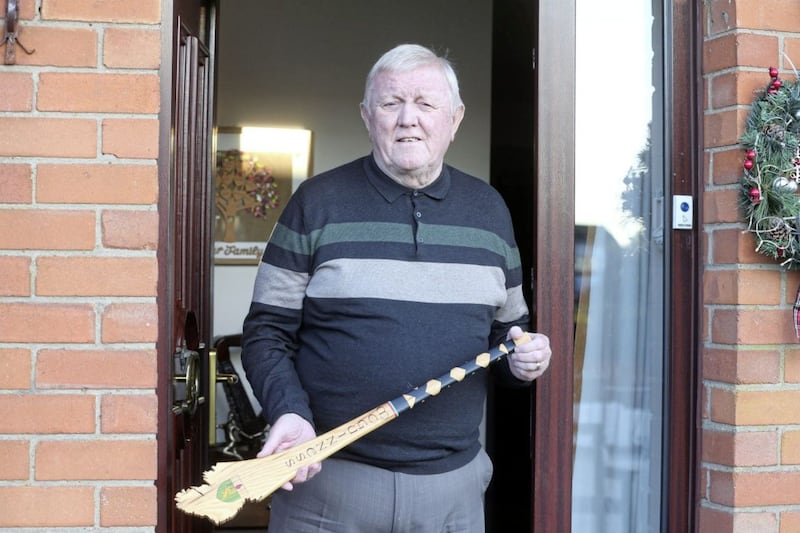I was asked to do a book, he was going to ghost write it for me… I says, 'Do you know a good solicitor?'
'What do you mean?', he asked.
'Well, if I told you the truth I'd be in court'.
'The names have been changed to protect the innocent…'
For the record, answering the questions is John Joseph McGuinness the third. Who made his senior football debut at the age of 11 (reserves, admittedly). And learned more about the big ball code under the tutelage of former Armagh player Jim Aiken.
The latter, who went on to become a famous concert promoter, might have been well-suited to showcase the story, and stories, of the man better known as Sean McGuinness.
A self-proclaimed "boxing man", although that's not how he made his name or his fame.
Ah, that name. The same as his father: "John Joseph, everybody called him 'John Joe'.
"Believe it or not, I'm John Joseph too. As I said one time, he changed his name to Sean to get a job in the shipyard. That got printed in a book…" – and out booms that familiar, oft-repeated, throaty chuckle.
Despite his delight in taking a hand out of that author, Sean McGuinness in his managerial days would have been a reporter's dream – but also a nightmare.
Not because of any awkwardness; his first lecture on a hurling coaching course was 'How to treat the press' – and the advice was to work with them, rather than the traditional 'tell them nathin'.'
Even bearing in mind that – fairly transparent – shipyard joke, the problem wouldn't have been believing what he said either; quite the opposite in fact.
Sean McGuinness tells – and told - too much truth.
Age has mellowed him, so he bites his tongue now, or at least sprinkles his chat with cautionary phrases:
'Now, this is off the record…'
'You can keep this out of it…'
'For Christ's sake, you can't write this….'
'Don't print that, obviously.'
Yet even with those omissions and deletions, the achievements of the west Belfast man, the boxing-loving young footballer who became legendary in Down hurling, are more incredible than fiction.
He might have been an Antrim hurling legend too – probably should be regarded as one anyway – but there's very little sense of bitterness from big Sean. His only regrets are about certain defeats.
His has been a life of love and laughter. Love of sport, especially of hurling, love of club – Sarsfield's – and love of family.
Names and dates slip and fall through the cracks in his memories too, but the good times, all the craic, is never to be forgotten.
Son of the father
The influence of his father is readily acknowledged: "I'd a great father, a great man he was, he hurled for a team called the Rory O'Connor's, who were broke up, they were Fianna boys [the republican scouts organisation], and him and a bunch of them went to Davitt's, who were half-decent at hurling at the time.
"He always said to me: 'See if you've no principles, you've nothing'. I stood by them. Anywhere I was, I tried to stand by them. It didn't go down to well with a lot of people, but that's life."
Now 75, one of the 'war children', life was a battle for Sean and the McGuinness family even before living through war by another name from the Sixties onwards.
There's no self-pity, though, just trademark straight talking: "People might take exception if I say this: we were poor. But we didn't know we were poor. We were just living.
"We were the only Catholic street on that side of Divis Street. We got a terrible shellacking in '69, lost our houses. I was married by then."
Rewind, Sean, slow down.
His love of hurling came from his dad. "I remember him playing, used to go to the matches. Full back most of his life. I thought they were half-decent. He must have played until he was 40. He was a good oul' Gael.
"He never pushed me [into hurling], I was just more into it. A quiet man. When he spoke, he meant what he said. A straight guy."
Up the 'Paddies'
Although the Davitt's were a dual club, young Sean became a 'Paddy': "Davitt's had no underage teams at the time. I lived in Ardmoulin Avenue; looking straight up was the Sarsfield's club and an uncle used to take me down to the club – he looked after the club on a Wednesday night, what they called a 'marker', charged people going on the snooker table and so on.
"I'd my first match for Sarsfield's, senior reserve football, at 11 – we'd no team and they put in a jersey and stuck me in the corner [forward]. I was told going out 'See if a ball comes, don't go near it'."
That wasn't ever advice offered by McGuinness the manager, but it didn't put him off Gaelic games or the club, quite the opposite:
"I was very much involved in Sarsfield's; on the committee from about 17 to my late 50s. If you come to our house and the grandkids are here, everybody has a Sarsfield's jersey on them. 'Up the Paddies', as they shout to me."
To his delight, the club has named a cup after him. I said: "They usually wait until somebody's dead" – 'Well, you're not too far off'.
Proud to be 'the second oldest Sarsfield's man' still alive he chose for the cup to go to under-10s. He's spent decades coaching, at all levels, taking great pleasure in introducing youngsters to hurling: "I had a big Marina and I broke the springs on it twice, there were that many in it."
Back to his own youth, he was the eldest of seven, including five sisters. McGuinness admits he was well looked after, to his long-lasting benefit:
"Was I took by the hand? When I was going with [his now wife] Eileen my mum was saying 'Get his shoes, cleaned, smooth his shirt', to my sisters; they still cast it up to me.
"Eileen was one of the Wards. We are fifth generation Sarsfield's and Eileen's grandfather was chairman of Sarsfield's, she had four brothers who played, including Jimmy who played football, corner-back for Antrim for years. Eamonn, Barney, and Pearse, all played inter-county at some grade. You were indoctrinated when you went down there."
Times were tough, with emigration forced on many: "My father was a home bird, all his brothers went foreign."
For those who stayed, life was hard. The Wards lived near a police barracks: "I remember her father taking a heart attack, no phones or anything, and her mother sent her over to the barracks, rapped the door.
"She asked them to phone for an ambulance – and your man says 'I'll do it if you speak to us the next time we're passing'. That's a fact. She said 'Aye' – to get the ambulance."
From education to education
Sean junior was smart, but sport dominating his thinking: "I went to Hardinge Street, it was a Junior Tech – I got my Qualifying [exam], I'm bumming here – but the head brother told my father 'You're wasting time sending him to St Mary's, all he's interested in is football and hurling', St Mary's was more academic.
"Jim Aiken ran the football team in it, the concert promoter. I remember us winning some Belfast championship and he took us to the Whitehall Café in Ann Street; that was the first time I was ever in a café like that, white tablecloths, everything laid out. There was a wee man, great fiddler, Davy Rice, he took the hurling."
Even football and hurling weren't enough to keep Sean in formal education, though: "I left school when I was 15, glad to get out of it."
Going into the big wide world was daunting, for various reasons, not least the short but significant journey from west to east Belfast.
His working life took him to DC Products, then ICL, International Computers Limited, although that wasn't as hi-tech as it sounds. "I was an apprentice sheet metalworker, for the first 18 months in 'The Cage', the apprentice training school.
"The head of apprentice training was a Major White, and if you were pulling your weight he was exceptional to you.
"But it was on the Castlereagh Road; you can guess what that was like in '69. It wasn't pleasant."
Sean had married Eileen and moved out of Ardmoulin by then: "We bought a house up in Ladybrook, paid £3,100, which was dear enough, we were struggling. I put a roof on my conservatory about a year ago and it cost me £3,600. Eileen was an Irish dancing teacher so her money came in very handy."
Although he'd gladly left Junior Tech at the age of 15, Sean became an educator himself, in a role which demanded much more:
"Eventually I got a job in St Patrick's Training School as an engineering instructor. It was better known as 'the Boys' Home.' Most of the boys came from the courts, 'young offenders'.
"I loved it there, I spent 19 years there. The kids were unbelievable.
"You'd ask them about their weekend and get some very sad tales. The majority were good kids, just didn't get a chance.
"When I say that, when you saw them walking to the pictures on a Saturday they'd have scared the living daylights out of you!...I was only a wee lad."
Sean himself learned one lesson that he'd later put into practice as a hurling boss: "When they came in they were at Grade 4 but could work their way up to Grade 1, which meant they could get out over the weekend.
"We worked on a points system, you had to get 14 points to get out. Some from the house masters, some from the likes of me.
"I soon had it that everybody gets 10 or nobody gets nothing. Peer pressure then made sure everybody behaved," he laughs.
Some spent longer 'inside' in later life, as 'the Troubles' afflicted the north. "You know the McGlincheys? Remember they chased him around the south for long enough?
"I had Sean out playing for the Sarsfield's… many a time he spent the weekend here because every time he got out he got lifted. I was at his wedding.
"Eileen more than me used go visit him 'up above'; he was at Her Majesty's Pleasure for about 17 years. The night he got out, he spent it here."
It wasn't only Sean McGlinchey whom McGuinness involved with 'the Paddies' as his coaching career began, while still playing:
"The Boys' Home had a bit of a soccer team for a while but there were a few boys from Armagh, Cuchullain's, and I had them out hurling for Sarsfield's…"
Sarsfield's success
He was playing as well as coaching, although he says: "I wasn't a brilliant player, I was average. I played more football than hurling, because there was more football at that time. We won about six senior football leagues in the late Sixties.
"Hurling took second place for a long time. Then we took the big decision to enter the All-County [Hurling] League, after a heated meeting.
"We won the Intermediate Hurling Championship in '72 and then a fella Joe Duffy took over the management and I was a selector. I got a bad injury at Armoy, I was on a stick for about six months.
"We only ever won one senior hurling championship, in 1974 [beating Loughgiel Shamrocks, no less]; in '76 we won the League. A few boys from Gael Uladh came and played for us as they had no team, the Wards, Aidan Thornbury."
Sean took over as Sarsfield's boss in 1975 and although they lost that year's Antrim SHC Final to Ballycastle, his reputation as a coach/ manager grew.
The Antrim job
Typically, though, he's self-deprecating about how the county call came: "In '83 I was proposed as a selector for the Antrim team; they wanted five but could only get three because the county team wasn't great. Me, Neilly Patterson Sr, and Kevin Donnelly of Ballycastle.
"We met and they said 'We're two north Antrim men so you'd be better managing the team as we'd be a bit biased'. I said 'Right'. So that's how I became Antrim manager.
"We brought in Fergus McNaughton (Cushendall) and Eugene Traynor (Dunloy) and the five of us got on all right, although there were some rough meetings."
Progress came slowly. By the spring of 1986 they were still in Division Two of the National Hurling League, although their opening draw in Casement in the preceding October was the only match table-toppers Wexford didn't win. A final round loss in Mullingar meant hosts Westmeath also went up, with Antrim fourth, behind Tipperary.
In Championship there'd been little sign of improvement. Having lost by 20 points to Galway in 1983, Cork hammered the Saffrons by 24 in '84, and Offaly won by 14 in the 1985 All-Ireland semi-final.
Yet McGuinness's men almost pulled off what would have been an absolutely astonishing victory over the Rebels in 1986.
Antrim scored 25 times to Cork's 18, including racking up 24 points, the most Cork had ever conceded in senior championship. Unfortunately, the Rebels' tally included seven goals, with a hat-trick from Jimmy Barry-Murphy among them, in a 7-11 to 1-24 victory.
McGuinness still recalls that as a 'what might have been', the regret increased by a self-inflicted wound in terms of the absence of a key player:
"Sean McNaughton got put off in a club match along with a Ballycastle fella; Sean, the captain, got three months, the other two months. If Sean had got two months he would have been eligible. It wouldn't have happened in any other county, it was a personal thing.
"That near broke my heart, the decision coming two weeks before the All-Ireland semi-final, your captain and full-back suspended. It really got to me."
However, that wasn't the reason Sean McGuinness stepped away from the Antrim job.
Following his father's advice, he resigned over a matter of principle, relating to his beloved club Sarsfield's. Even now, he doesn't name names, on or off the record.
His friend Jim Nelson returned to take charge of the Saffrons: "Wee Jim obviously did a great job, getting to the All-Ireland Final [in 1989]."
That was a brief bright spot amid dark days and nights for many in the north back then, not least in west Belfast. "There was nobody going out of the area at the time," remembers McGuinness.
Later that same year, though, he headed off in a different direction, embarking on an unforgettable journey with the Down hurlers.
* In Monday's paper Sean McGuinness recalls some of the fun and games he had with the Down hurlers from 1989 to 1995.


